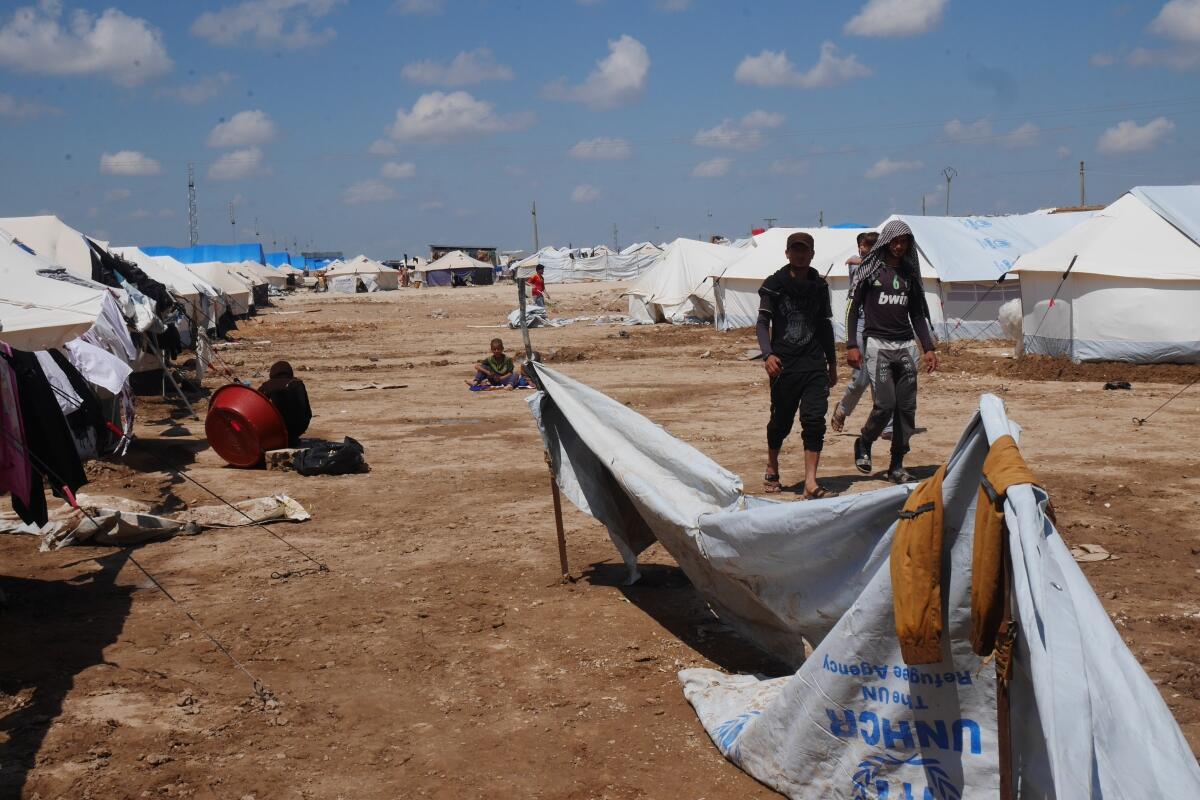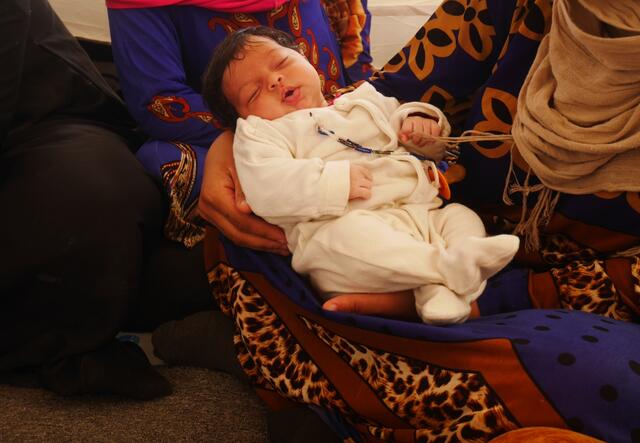
In Syria, people already forced from their homes by war have yet again become victims of deadly attacks.
Since October, thousands have fled fighting in Mosul, Iraq and travelled west to Syria, past the Rajm al-Salibi border crossing and into Al Hol camp. After yesterday’s bombing at Rajm al-Salibi, an estimated 400 more people, many traumatised, have been transferred from the border to Al Hol.
Now, almost 17,000 people live in this camp in Northeast Syria. The majority are Iraqi refugees, with a growing number of displaced Syrian families. Everyone is fleeing ISIS.
Among them is 20 year-old Sherine, who left Mosul in November of last year, one month into the fierce battle to retake the city from ISIS.
She was 22 weeks pregnant with her first child. It would take her five months to reach Al Hol camp, in a journey that bitterly paralleled her first pregnancy.
We spoke to Sherine about her ordeal. This is what she told us, recounting the steps she and her family have taken in the pursuit of a better life in time for the birth of her child.
Step 1. First trimester
Like so many expectant parents, Sherine and her husband spent her first trimester dreaming of the future with their new baby.
“In Mosul, we were planning, talking about how to raise the baby, so many things.”
Sherine stares blankly as she talks. But every time she glances at baby Ihab, her 20-day-old son, she breaks into a smile.
“He looks like his father, but he has my eyes,” she says.
But Ihab’s father is not here in the camp – he died in the early days of fighting in Mosul. Sherine was 4 months pregnant at the time.
Step 2. Escape from Mosul
After her son-in-law’s death, Sherine’s mother Noor decided that it was time for the family to leave Mosul.
“Life under ISIS was like a prison. It got worse and worse. When the bombing started, that’s when we left,” she told us.
But for a widow with 6 children, leaving was a challenge. “We heard about Al Hol camp, that life was okay there. But the route going west was difficult, and I had no money to pay a smuggler.”
Other families preparing to flee made room for Noor and her kids in their trucks. Pregnant Sherine and her sisters climbed into the flatbeds in the back of a truck. For nine cold hours under the cover of night, they made the dangerous journey. Finally, they arrived in Baaj, a town 40 kilometers from the Syrian border.
Noor looks over at Sherine, and recounts her two months in Baaj. “She would cry and say, ‘If my husband was here he would take me to the doctor and care for me. I am happy about the baby, but my happiness is not complete.’” The baby had started kicking.
The family was not safe for long. In January, more airstrikes forced them into the desert between Baaj and the Syrian border.
Step 3. Back on the Road
The family moved between villages gutted by years of armed conflict. Sherine was getting bigger, moving into the final weeks of her pregnancy.
Noor describes their grim situation. “We sheltered in bombed-out huts, collecting rain water and eating food from others. We were waiting for a chance to go to the border, but we didn’t know the way.”
Whilst speaking to us, Sherine lifted the hem of her robe and pulled down her dusty sock, revealing small white rings of fungus covering her skin. “I’ve had these for a while. In the villages, we only had dirty rain water and no soap. I didn’t bathe for a month.” She sighed. “In Mosul, we took showers every day.”
Step 4. Labour and birth on the border
In late March, Sherine went into labour in a cold, windowless room leaking rainwater. She was surrounded by her sisters.
“Labour was so hard. I was scared.“
Sherine’s 19-year-old sister Rima adds, “We were all in the same room when she gave birth to Ihab. Water was coming through the roof. She was bleeding. We were so cold, but we used all of the blankets for Sherine and the baby. We didn’t want to lose them.”
Two days later, Sherine walked for 11 hours to reach the border crossing into Syria, carrying her infant son. The family joined others on a route strewn with mines. “We were terrified. People were literally moving mines out of the road with their hands. ISIS fighters were also on the road, trying to leave Iraq. We didn’t know who to trust.”

Step 5. The start of a new life
The family only arrived in Al Hol camp from the border in mid April. Sherine and her baby, now 3 weeks old, are struggling.
The camp’s residents - those who came from Mosul late last year, and more recently arrived Syrians from Deir Ezzor – face a shortage of health services. There are hundreds of pregnant and lactating women in Al Hol, plus adults like Noor who have chronic diseases, but have gone without medication or care for months.
Sherine and Ihab can get care at a temporary IRC clinic that sees close to 100 patients each day. IRC’s outreach workers will also visit her family to follow up. Noor praises the IRC staff who visited and assessed her family: “They listened to us. We told them about everything that happened. They made us feel comfortable, gave us hope.”
IRC has built a permanent clinic in Al Hol specialising in maternal and child health, and mental health care. A new centre for women and girls will open as well, a refuge in the desert camp with air-conditioned tents where women can get counselling, group support, and join recreational activities. The entire site will begin serving camp residents in May.
In their tent, Rima looks around at her family. “Now here we are. My sisters are safe, things will get better. We feel we are reborn again.”
Names have been changed to protect identities.
Find out more about our work in Syria and how you can support families in crisis.